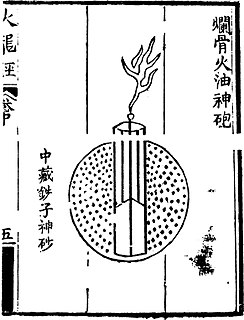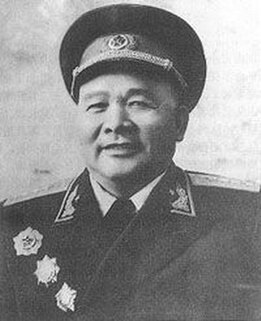 W
WGe Yunfei was a Chinese general of the Qing dynasty. He served in the First Opium War and died during the British capture of Chusan.
 W
WGuo Huaruo was a Chinese military strategist and lieutenant general of the People's Liberation Army. According to Alastair Iain Johnston, Guo was until the mid-1980s "the CCP's most authoritative interpreter and annotator" of The Art of War by Sun Tzu, but Guo was "practically unknown in the West".
 W
WJiao Yu was a Chinese military officer, philosopher, and writer of the Ming dynasty under Zhu Yuanzhang, who founded the dynasty and became known as the Hongwu Emperor. He was entrusted by Zhu as a leading artillery officer for the rebel army that overthrew the Mongol Yuan dynasty, and established the Ming Dynasty. As a senior adviser and general, he was later appointed to the venerable and noble status of the Count of Dongning. He edited and wrote a famous military treatise that outlined the use of Chinese military technology during the mid 14th century based on his military campaign of 1355 AD. However, descriptions of some gunpowder weapons in his treatise derive from Song Dynasty materials on battles against the Khitans, Jurchens and Mongols. His Huolongjing, translated as the Fire Drake Manual, contains descriptions of fire arrows, fire lances, grenades, firearms, bombards, cannons, exploding cannonballs, land mines, naval mines, rockets, rocket launchers, two-stage rockets, and various gunpowder solutions including poisonous concoctions.
 W
WLin Hu was a Chinese aviator, fighter pilot and lieutenant general of the People's Liberation Army Air Force (PLAAF). Born to a Russian mother and a Chinese father, he was orphaned at a young age. Lin joined the Eighth Route Army to fight in the Second Sino-Japanese War before he turned 11. After the Second World War, he was trained as a fighter pilot and fought in the Korean War and the Second Taiwan Strait Crisis. He served as deputy commander of the PLA Air Force from 1985 to 1994 and attained the rank of lieutenant general in 1988.
 W
WLiu Bocheng was a Chinese Communist military commander and Marshal of the People's Liberation Army.
 W
WLiu Ji, courtesy name Bowen, better known as Liu Bowen, was a Chinese military strategist, philosopher, politician, and poet who lived in the late Yuan and early Ming dynasties. He was born in Qingtian County. He served as a key advisor to Zhu Yuanzhang, the founder of the Ming dynasty, in the latter's struggle to overthrow the Yuan dynasty and unify China under his rule. Liu is also known for his prophecies and has been described as the "Divine Chinese Nostradamus". He and Jiao Yu co-edited the military treatise known as the Huolongjing.
 W
WLiu Huaqing was Chinese revolutionary and an admiral of the People's Liberation Army Navy, who served as the third Commander-in-Chief of the Navy from 1982 through 1988. He is considered to have greatly contributed to the modernization of the Chinese Navy, and is hailed as the "father of the modern Chinese Navy" and "father of Chinese aircraft carriers".
 W
WLiu Yalou was a general in the Chinese People's Liberation Army who served as the inaugural commander-in-chief of the PLA Air Force During the Chinese Civil War, he was chief of staff of Lin Biao's army group, which occupied the entire Manchuria in 1948 and captured 472,000 Kuomintang troops in the Liaoshen Campaign.
 W
WMao Zedong, also known as Chairman Mao, was a Chinese communist revolutionary who was the founder of the People's Republic of China (PRC), which he ruled as the chairman of the Communist Party of China from its establishment in 1949 until his death in 1976. Ideologically a Marxist–Leninist, his theories, military strategies, and political policies are collectively known as Maoism.
 W
WQi Jiguang, courtesy name Yuanjing, art names Nantang and Mengzhu, posthumous name Wuyi, was a Chinese military general and writer of the Ming dynasty. He is best known for leading the defense on the coastal regions against wokou pirate activities in the 16th century, as well as for the reinforcement of the Great Wall of China. Qi is also known for writing the military manuals Jixiao Xinshu and Lianbing Shiji or Record of Military Training (練兵實紀), which he based on his experience as a martial educator and defensive planner in the Ming military forces. He is regarded as a hero in Chinese culture.
 W
WShen Kuo or Shen Gua, courtesy name Cunzhong (存中) and pseudonym Mengqi Weng (夢溪翁), was a Chinese polymathic scientist and statesman of the Song dynasty (960–1279). Excelling in many fields of study and statecraft, he was a mathematician, astronomer, meteorologist, geologist, entomologist, anatomist, climatologist, zoologist, botanist, pharmacologist, medical scientist, agronomist, archaeologist, ethnographer, cartographer, geographer, geophysicist, mineralogist, encyclopedist, military general, diplomat, hydraulic engineer, inventor, economist, academy chancellor, finance minister, governmental state inspector, philosopher, art critic, poet, and musician. He was the head official for the Bureau of Astronomy in the Song court, as well as an Assistant Minister of Imperial Hospitality. At court his political allegiance was to the Reformist faction known as the New Policies Group, headed by Chancellor Wang Anshi (1021–1085).
 W
WSong Xilian was a Kuomintang general from Hunan. He was last in charge to moving remaining KMT troops to Xikang Province. He was captured and tried as an enemy of people and was finally released in the 1980s. He spent his remaining years in retirement in the United States and wrote about his military years and affiliation with Huangpu Academy.
 W
WXu Haidong was a senior general in the People's Liberation Army of China.
 W
WYuan Shikai was a Chinese military and government official who rose to power during the late Qing dynasty, becoming the Emperor of the Empire of China (1915–1916). He tried to save the dynasty with a number of modernization projects including bureaucratic, fiscal, judicial, educational, and other reforms, despite playing a key part in the failure of the Hundred Days' Reform. He established the first modern army and a more efficient provincial government in North China in the last years of the Qing dynasty before the abdication of the Xuantong Emperor, the last monarch of the Qing dynasty, in 1912. Through negotiation, he became the first official president of the Republic of China in 1912. This army and bureaucratic control were the foundation of his autocratic rule as the first formal President of the Republic of China. He was frustrated in a short-lived attempt to restore hereditary monarchy in China, with himself as the Hongxian Emperor. His death shortly after his abdication formalized the fragmentation of the Chinese political system and the end of the Beiyang government as China's central authority.
 W
WZeng Gongliang (998–1078) was a Chinese scholar of the Song Dynasty, who helped write the Wujing Zongyao.